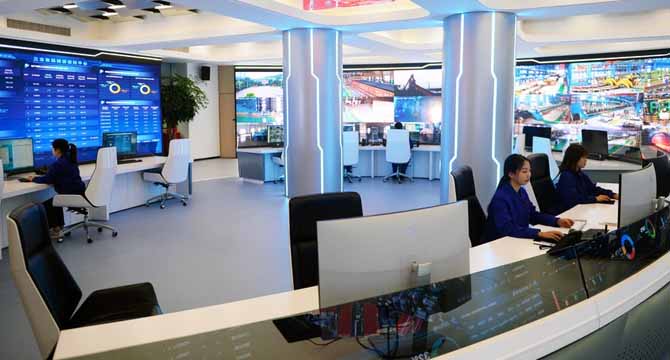FUZHOU, June 21 (Xinhua) — The city of Zhangzhou in east China’s Fujian Province has been a model of balancing development for now and the future.
It is a top-50 city in China in terms of economic output. The city’s GDP increased 6.9 percent year on year to 570.66 billion yuan (about 79.5 billion U.S. dollars) in 2022, and was up 5.5 percent in the first quarter of this year.
Zhangzhou’s competitive industries cover traditional sectors like petrochemical engineering, food processing and equipment manufacturing, as well as emerging ones such as electronic information, new energy and digital services.
Meanwhile, Zhangzhou has been exerting efforts to safeguard sustainable development. The forest coverage rate is nearly 65 percent in the city, much higher than the national level, and enterprises there are seeking a greener development path with future generations in mind.
FOR FUTURE ENVIRONMENT
Founded in 1999, Sanbao Group has upgraded its steel-making business with innovative and environmentally friendly steps.
It integrated the world’s most advanced technologies and equipment into a production line with the aim of providing high-quality and lightweight steel for new energy vehicles and batteries.
The group also invests massively in energy conservation and emission cuts for a better environment. It has shortened the steel-making process and hence reduced carbon emissions and power consumption to the world’s leading level.
Moreover, Sanbao has lowered its emissions of sulfur dioxide and nitrogen oxides to match the country’s strictest standard, deployed new energy vehicles to transport bulk materials and goods, and started a solar power project with an investment of over 1 billion yuan, which is expected to cut annual carbon dioxide emissions by about 70,000 tonnes.
“All these measures aim to ensure Sanbao’s high-quality sustainable development and contribute to environmental protection,” said Lin Jun, Party chief of Sanbao.
Zhangzhou’s government has been strengthening ecological protection and pushing forward the conservation and restoration of key areas like the Jiulong River basin to sustain blue skies, clean soil and lucid water.
According to its five-year plan for 2021-2025, the city will boost the transformation of the steel and petrochemical industries, improve the efficiency of energy use, and start the construction of low-carbon pilot zones.
It also plans to build a major clean energy base with an output value of 50 billion yuan by 2025.
FOR FUTURE GENERATIONS
In a smart classroom, the lamplight is very close to natural light and the sound from small speakers dotted above the lighting equipment can reach every inch of the room.
This is displayed at LEEDARSON, a high-tech corporation that specializes in the Internet of Things (IoT) and which has topped the export of LED lighting products for six consecutive years in China.
Chen Wei, LEEDARSON’s product manager, said that the company started with smart illumination and then entered IoT, and is dedicated to bringing IoT products into homes and schools.
LEEDARSON has been investing in smart education facilities since 2014, and a series of products have gained popularity, said Xu Jianxing, deputy manager of LEEDARSON’s smart education department.
Loud sounds from traditional speakers could impair children’s hearing, he said, adding that the company’s smart solutions can help protect the health of students.
Frog Prince Group is another enterprise concentrating on child care. The group is a research base for daily child care products in China.
The company has collaborated with famous domestic and foreign brands to upgrade its products for children’s healthy and fun daily lives, said Li Liang, the group’s deputy manager of child care products.
Last year, Zhangzhou government’s spending on improving people’s well-being accounted for nearly 80 percent of its general public budget expenditure. The city renovated and expanded a batch of public kindergartens and primary and middle schools. The number of hospital beds per 1,000 people surged to 6.1 in 2022 from 2.95 in 2012.

